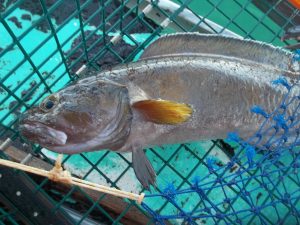SSI-Funded Team Works With Lobstermen to Study Fish Caught in Traps
 Cusk don’t have much charisma. The cod-like intruders slide out of lobster traps with bubbling skin, regurgitated stomachs and bulging eyes. They have no real commercial viability and virtually no name recognition.
Cusk don’t have much charisma. The cod-like intruders slide out of lobster traps with bubbling skin, regurgitated stomachs and bulging eyes. They have no real commercial viability and virtually no name recognition.
But in the Gulf of Maine, these bottom feeders are bellying into the klieg lights.
Cusk, which are hauled to the surface offshore as accidental “bycatch”, have been designated a “species of concern” by the National Oceanic and Atmospheric Administration (NOAA). That means the administration is concerned about dipping population numbers. If cusk become scarce enough, the fish could become an official protected species – a move that could restrict commercial fishing territory in the gulf, some of which has been worked by lobstering families for decades.
With a grant from the Sustainability Solutions Initiative (SSI), a program of the Senator George J. Mitchell Center at UMaine, researchers have begun working with lobstermen in several communities to better understand how they interact with cusk, how often these interactions occur, and whether a voluntary safe-release system is possible. See more on this story…
